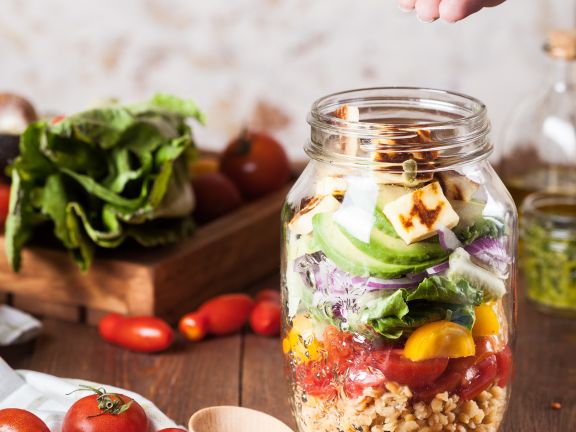
How should one eat? What is healthy, what is excessive? And how many ‘sins’ are we allowed? There has never been more information about healthy eating than today, dear readers – and at the same time, the uncertainty about what is right and wrong has never been greater. This is evident in the increasing number of overweight people worldwide. Regarding Germany, half of all men and a third of all women are overweight, and this trend is literally growing.
To navigate through the plethora of recommendations and make the right choices among all the available foods, it helps to ask a fundamental question: What should nutrition actually achieve?
The answer is quite simple: First, food should provide us with the necessary energy we need every day. Then, everything the body needs for maintenance and structure building should be contained in food – such as vitamins, minerals, trace elements, amino acids, and so on. Additionally, healthy eating should protect us from diseases and ensure a long life. And lastly, the right nutrition should give us a body in which we feel comfortable.
In reality, due to ignorance, stress, and sometimes laziness, healthy and balanced nutrition often falls by the wayside. However, it’s not so difficult to avoid the biggest nutritional mistakes!
Nutritional Mistake 1: Imbalanced Diet
“Enjoy the diversity of foods” is number 1 of the 10 Golden Nutrition Rules of the German Nutrition Society. I strongly agree with this statement! The more diverse your diet, the lower the risk of an imbalanced diet. And yes! Variety also includes sugar, butter, bacon, and other foods that many people avoid fearfully. However, no food is a fundamental threat to us! It’s about the right balance. As long as the supposedly unhealthy foods make up only a certain percentage of daily nutrition, there’s nothing wrong with them. On the contrary, allowing oneself ‘forbidden’ foods prevents cravings.
On the other hand, “enjoying the diversity” is, of course, an encouragement not to eat the same thing every day. Unfortunately, in daily life, we tend to fall into fixed eating patterns.
Remember!
No food is taboo! Embracing diverse nutrition prevents potential deficiencies and also helps prevent cravings for ‘forbidden’ foods.
Nutritional Mistake 2: Not Enough Vegetables
The recommendation for a healthy diet is five portions of fruits and vegetables a day. Do you achieve that? Few of us reach the recommended ‘greens’ intake. Yet, through fruits and vegetables, our bodies not only absorb vitamins, minerals, and fiber but also secondary plant substances. These secondary plant substances give foods their color, smell, or taste. They don’t provide us with energy, but their health-promoting effects are scientifically proven.
Among other things, secondary plant substances protect the cells in our body, helping prevent inflammations, including certain types of cancer. For example, anthocyanins give many fruits and vegetables their characteristic dark red-purple color. They are found in cherries, grapes, beetroots, and purple carrots. Anthocyanins belong to flavonoids, which can reduce the risk of certain cancers and cardiovascular diseases. Additionally, they have a blood-pressure-lowering and antibiotic effect.
The fiber found in fruits and vegetables is also extremely important for a healthy gut flora, which in turn plays a significant role in our metabolism and immune system.
Nutritional Mistake 3: Not Enjoying the Food
How often do you eat while walking, in front of a screen, or the TV? Those who eat casually and in haste miss out on a crucial component: enjoyment. Taking time for meals—both in their preparation and consumption—leads to more mindful eating and often eating less, as the feeling of fullness has time to set in. Solid main meals that taste good and are filling also help to avoid snacking in between. Often, it’s not the indulgent meal but the many small sins that disappear in our mouths alongside other activities that contribute to weight gain. Therefore, I recommend a consistent calorie break of four to five hours until the next meal – this also applies to calorie-rich drinks like lattes!
Remember!
Eating while walking or standing leads to overeating beyond satiety. Meal breaks should be celebrated – it then becomes easier to avoid afternoon snacks.
Nutritional Mistake 4: Not Eating Enough
When one eats too little, the body cells become undernourished, leading to a deficiency in the internal organs and the brain. To prevent long-term damage to the internal organs, the body reduces its requirements: the metabolism slows down to avoid wasting energy. The rest of the energy needs are covered by breaking down energy-consuming systems and using the resulting energy. In this case, energy consumers are muscles. The body breaks them down to gain energy. Thus, when we save too many calories, we lose our most important metabolic engine—muscles. Fat stores, however, remain as a last resort and are only broken down at the very end.
The recommendation not to eat too little does not mean a free pass for indulgence. On the contrary! For those who want to stay slim without depriving the body of energy and nutrients, it’s best to practice caloric restriction. In concrete terms, this means only eating until you are about 70 to 80 percent full. For example, people in the Japanese region of Okinawa, who have the highest life expectancy in the world, follow this practice.
Caloric restriction slows down the aging process. The reason likely lies in the reduction of oxidative stress. Human cells remain intact for a longer time, leading to a longer life. A protective enzyme called Sirtuin is released more during caloric restriction, slowing down aging processes.
Remember!
A slight caloric restriction keeps you slim and young. Rule of thumb: Only eat until about 70 to 80 percent full.
Nutritional Mistake 5: Not Paying Attention to Personal Needs
The best nutrition tips are useless if they don’t align with one’s preferences and daily life. If you’re simply not hungry in the morning, there’s no need to force yourself to eat a bowl of cereal or yogurt! Maybe your appetite only arrives later in the morning, or perhaps a green smoothie or a large latte is enough for you in the morning if you eat an early lunch.
Similarly, the advice to eat as much raw food as possible might not suit everyone. Some people simply don’t do well with raw vegetables. They could try steamed or blanched variations.
Eating should be about pleasure and enjoyment – so always listen to your body and don’t follow advice that doesn’t make you feel good.
You see: to eat healthily and feel good, it takes, besides a few basic rules, healthy common sense.”

